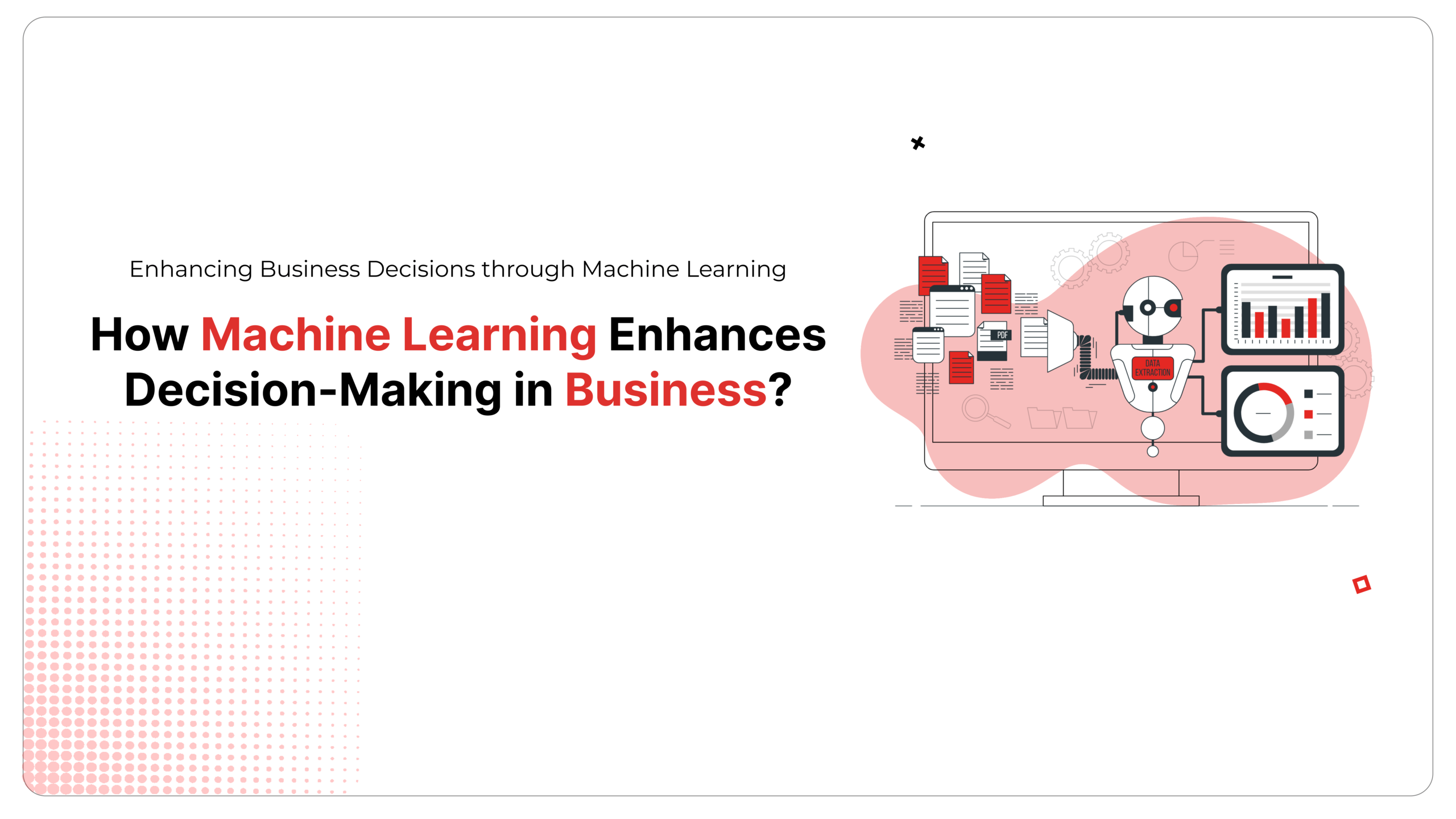How Machine Learning Enhances Decision-Making in Business

In today’s information-rich environment, businesses grapple with decision-making amidst rapid change. Conventional methods relying on limited data and intuition fall short, but Machine Learning (ML) revolutionizes operations. ML, using data-driven algorithms, discerns patterns, predicts outcomes, and automates decisions. Its significance in business is paramount: harnessing insights from vast data troves and converting raw info into actionable intelligence. This approach, driven by predictive analytics, steers firms to foresee customer behavior, optimize resources, and navigate markets accurately.
ML drives automation, slashing mundane tasks, and deploying algorithms for intricate computations, boosting operational efficiency, and fostering a competitive edge by freeing human resources for strategic pursuits.
Machine Learning Applications in Business
Machine learning (ML) is transforming how businesses operate, impacting diverse industries like finance, retail, and healthcare. From fraud detection and risk assessment to personalized product recommendations and optimized marketing campaigns, ML empowers businesses with data-driven insights for better decision-making.
Consider the case of Netflix, whose ML-powered recommendation engine significantly boosts user engagement and drives revenue. Similarly, Amazon’s ML-driven inventory management system optimizes stock levels, minimizing costs and ensuring product availability. These are just a glimpse into the vast potential of ML, demonstrating its transformative power across industries.
Harnessing Data-Driven Insights
In today’s data-centric landscape, leveraging information is key. Businesses gain a competitive edge by harnessing data-driven insights, employing data to discern trends and patterns, and making informed decisions driving growth. It starts with collecting accurate, timely data from diverse sources—customer transactions, and operations—and then refining it for reliability. Utilizing robust analysis tools extracts meaningful insights and hidden patterns.
Visualizing data via dashboards aids comprehension and inter-departmental communication. Sharing insights aids evidence-based decision-making over speculation. Benefits include improved decision-making clarity, heightened efficiency through process optimization, enhanced customer experiences via personalization, and risk reduction through early problem identification. Embracing data-driven strategies is crucial for enduring success in today’s competitive market.
Predictive Analytics Transforming Decision-Making
In an era of uncertainty, businesses must move beyond relying solely on historical data and intuition. Predictive analytics serves as a potent tool, using advanced algorithms to analyze past data, spot patterns, and forecast future trends. Its impact is evident across industries; for instance, UPS optimizes routes, predicts demand, and prevents delays, enhancing efficiency. Netflix’s success partly relies on predictive algorithms recommending content, boosting engagement.
The benefits of predictive analytics span industries: demand forecasting, risk assessment, fraud detection, price optimization, and targeted marketing. Embracing predictive analytics enables proactive decision-making, empowering businesses to foresee challenges, seize opportunities, and navigate changes confidently, ultimately ensuring their success in today’s competitive landscape.
Algorithmic Decision-Making
Algorithmic decision-making (ADM) offers a crucial solution in a data-saturated world, aiding in complex decision-making processes. Leveraging sophisticated algorithms trained on extensive datasets, ADM automates routine decisions, optimizes resource allocation, and ensures decision consistency. For instance, in banking, algorithmic decision-making systems analyze borrower data, providing fairer and more accurate loan assessments.
However, algorithmic decision-making poses challenges, including potential biases and transparency issues. Implementing responsible practices, such as diverse data use, regular algorithm audits, and human oversight, is crucial. By addressing these challenges, businesses can harness algorithmic decision-making’s potential to revolutionize decision-making across sectors while upholding ethical standards and accountability.
Automation in Business Processes
Automation in Business Processes integrates technology to streamline workflows, aiming for efficiency and productivity. It simplifies repetitive tasks, reducing errors and saving time. Automation ensures consistency, enhances compliance, and allows resource reallocation for complex tasks. Machine learning-based automation further elevates efficiency by predicting trends, personalizing experiences, and continuously optimizing processes.
It empowers data-driven decision-making and improves strategic planning. In summary, automation in business, bolstered by machine learning, optimizes workflows, minimizes errors, personalizes experiences, and drives efficiency, enabling businesses to operate seamlessly and make informed, data-backed decisions.
Future Trends and Prospects
Machine learning’s future in business decision-making foresees exponential growth, leveraging advanced algorithms for nuanced decisions. Real-time support and predictive analytics advancements will enable quicker responses and proactive strategies. Enhanced automation and personalized experiences will optimize interactions and services.
ML’s interdisciplinary integration will revolutionize industries by amalgamating insights from various domains. Ethical considerations will prioritize fairness and transparency in AI. Overall, machine learning’s evolution promises significant strides in algorithms, analytics, and automation in business, and ethics, revolutionizing strategic and algorithmic decision-making across industries.
Conclusion
In an era of rapid change, Machine Learning (ML) emerges as a pivotal force in transforming decision-making in businesses. Leveraging data-driven algorithms, ML propels predictive analytics, empowering firms to forecast trends, optimize resources, and navigate markets with precision. As businesses harness insights from vast data sets, ML fosters automation in business, slashing mundane tasks, and driving efficiency. This transformative landscape of ML foresees exponential growth, driving real-time support, predictive analytics, and interdisciplinary integration, promising nuanced decisions.
Enhanced automation and ethical considerations pave the path for transparent, personalized experiences, revolutionizing strategic decision-making. ML’s evolution assures substantial strides in algorithms, analytics, and ethical practices, heralding a future where informed, data-backed decisions steer industries toward enduring success.


